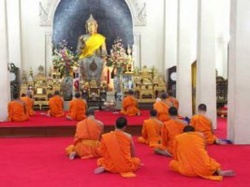Difference between revisions of "Chanting"
(Created page with "thumb|250px| Chanting (jappa or saṅgīti) is the rhythmic reciting of words or phrases unaccompanied by music. Chanting had an important part to play i...") |
|||
| Line 1: | Line 1: | ||
[[File:Chanting.jpg|thumb|250px|]] | [[File:Chanting.jpg|thumb|250px|]] | ||
| − | Chanting (jappa or saṅgīti) is the rhythmic reciting of words or phrases unaccompanied by music. Chanting had an important part to play in the transmission of the Dhamma. For at least 300 years, monks and nuns regularly met together to chant the suttas so as to commit them to memory. Today, chanting has a social, contemplative and even a therapeutic value. A period of chanting can silence thoughts and focus attention and so be a good preparation for meditation. There is a widespread belief that chanting the words of the Buddha, especially discourses like the Mettā Sutta, can have a healing effect and there is some evidence to support this belief. The gentle pleasing sound of the chant can soothe both body and mind and the group of people who have gathered to chant can make the sick person feel wanted and cared for, which assists the healing process. | + | [[Chanting]] ([[jappa]] or [[saṅgīti]]) is the rhythmic reciting of words or phrases unaccompanied by {{Wiki|music}}. [[Chanting]] had an important part to play in the [[transmission]] of the [[Dhamma]]. For at least 300 years, [[monks and nuns]] regularly met together to [[chant]] the [[suttas]] so as to commit them to [[memory]]. Today, [[chanting]] has a {{Wiki|social}}, contemplative and even a therapeutic value. A period of [[chanting]] can [[silence]] [[thoughts]] and focus [[attention]] and so be a good preparation for [[meditation]]. There is a widespread [[belief]] that [[chanting]] the words of the [[Buddha]], especially discourses like the [[Mettā Sutta]], can have a [[healing]] effect and there is some {{Wiki|evidence}} to support this [[belief]]. The gentle [[pleasing]] [[sound]] of the [[chant]] can soothe both [[body]] and [[mind]] and the group of [[people]] who have [[gathered]] to [[chant]] can make the sick [[person]] [[feel]] wanted and cared for, which assists the [[healing]] process. |
| − | The 7th century Chinese monk I-tsing listed these benefits of chanting: ‘It enables us to know the virtues of the Buddha, we learn to appreciate poetry, it purifies the tongue, the chest is expanded, we learn confidence in the congregation and it imparts good health (by encouraging deep breathing).’ See Music. | + | The 7th century {{Wiki|Chinese}} [[monk]] [[I-tsing]] listed these benefits of [[chanting]]: ‘It enables {{Wiki|us}} to know the [[virtues]] of the [[Buddha]], we learn to appreciate [[poetry]], it purifies the {{Wiki|tongue}}, the {{Wiki|chest}} is expanded, we learn [[confidence]] in the congregation and it imparts good health (by encouraging [[deep breathing]]).’ See {{Wiki|Music}}. |
{{R}} | {{R}} | ||
[http://www.buddhisma2z.com/content.php?id=72 www.buddhisma2z.com] | [http://www.buddhisma2z.com/content.php?id=72 www.buddhisma2z.com] | ||
Revision as of 12:14, 23 September 2013
Chanting (jappa or saṅgīti) is the rhythmic reciting of words or phrases unaccompanied by music. Chanting had an important part to play in the transmission of the Dhamma. For at least 300 years, monks and nuns regularly met together to chant the suttas so as to commit them to memory. Today, chanting has a social, contemplative and even a therapeutic value. A period of chanting can silence thoughts and focus attention and so be a good preparation for meditation. There is a widespread belief that chanting the words of the Buddha, especially discourses like the Mettā Sutta, can have a healing effect and there is some evidence to support this belief. The gentle pleasing sound of the chant can soothe both body and mind and the group of people who have gathered to chant can make the sick person feel wanted and cared for, which assists the healing process. The 7th century Chinese monk I-tsing listed these benefits of chanting: ‘It enables us to know the virtues of the Buddha, we learn to appreciate poetry, it purifies the tongue, the chest is expanded, we learn confidence in the congregation and it imparts good health (by encouraging deep breathing).’ See Music.
